Best Law Schools On The East Coast: Top 10 Picks
When looking for a perfect law school, future students have to consider a whole range of factors. Luckily, the options are pretty broad if you are based in the US. This country is known to be home to some of the world’s best law schools, and some of the best options are gathered on the East Coast of the US.
If you are located on the East Coast yourself or planning to relocate there to acquire your legal education, we have you covered! In this article, we have prepared a list of the best law schools located in this region that you can consider for receiving top-level education.
Table of Contents
- 1. University Of Virginia
- 2. University Of Florida
- 3. University Of Pennsylvania
- 4. University Of Georgia
- 5. College Of William & Mary
- 6. Florida State University
- 7. Harvard Law School
- 8. Columbia Law School
- 9. New York University School Of Law
- 10. Duke University School Of Law
- The Importance Of Choosing The Right Law School
- Factors To Consider When Choosing A College
- Comparing East Coast Law Schools
- The Bottom Line
1. University Of Virginia
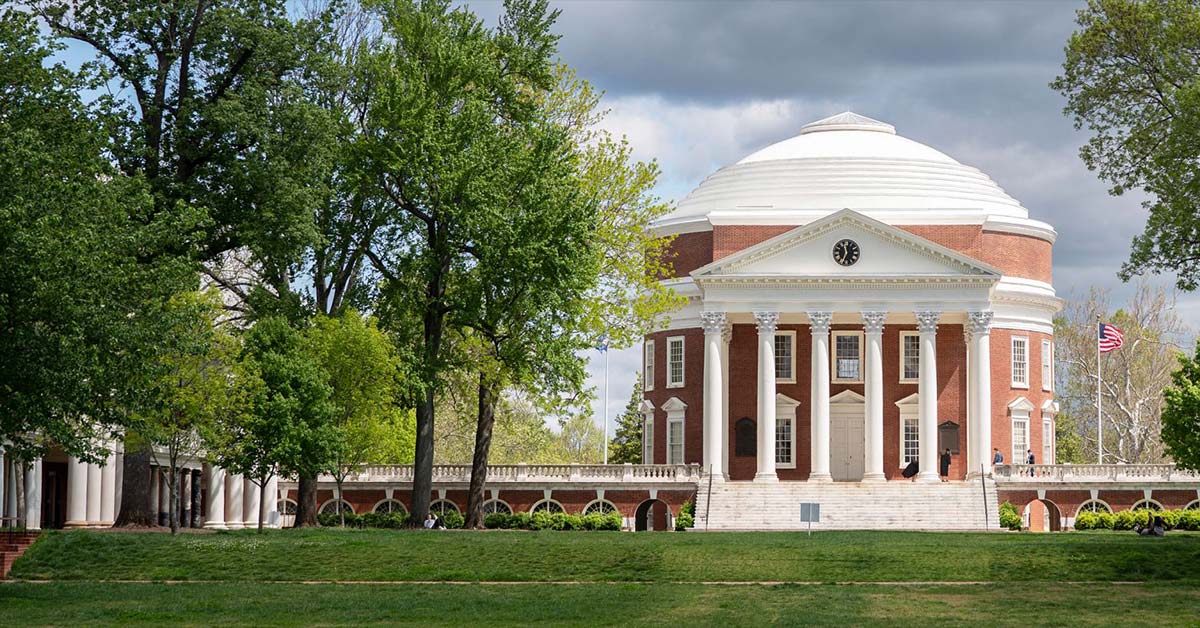
The University of Virginia School of Law, established in 1819 by Thomas Jefferson, is the second-oldest continuously operating law school in the United States. Located in Charlottesville, Virginia, UVA Law has cultivated a reputation for academic excellence and public service. It ranks #4 among all law schools in the U.S. according to U.S. News & World Report’s 2025 rankings, underscoring its prestige and consistent performance across various specialties, such as Constitutional Law (#5), Criminal Law (#3), and Tax Law (#5).
UVA Law offers several degree programs, including the Juris Doctor (J.D.), the Master of Laws (LL.M.) for international lawyers, and the Doctor of Juridical Science (S.J.D.) for academic careers. The school also supports dual-degree programs like J.D.-M.B.A. and J.D.-M.P.P. that combine law with business or policy education. In 2025, the school reported a competitive acceptance rate of just 13.9%, with enrolled students boasting a median undergraduate GPA of 3.96 and a median LSAT score of 172 (25th-75th percentile: 167–174).
Tuition for the 2025 academic year is $74,700 for in-state students and $77,700 for out-of-state students. Despite the high cost, the investment is well-justified—96.5% of graduates pass the Bar on their first attempt, and 99.3% achieve full-credit employment within ten months of graduation. With a low student-faculty ratio of 5.7:1 and a reputation for collegiality and practical training, UVA Law remains a top choice for aspiring legal professionals committed to excellence and leadership in the field.
2. University Of Florida

The University of Florida’s Fredric G. Levin College of Law, founded in 1909, is Florida’s oldest public law school and ranks #38 nationally according to U.S. News & World Report’s 2025 rankings. Located in Gainesville, Florida, the school is renowned for its affordability and academic strength. With a student-faculty ratio of 6.9:1 and a highly selective acceptance rate of 17.4%, UF Law provides a competitive and supportive learning environment for aspiring legal professionals.
The Levin College of Law offers a robust Juris Doctor (J.D.) program, along with a highly regarded Graduate Tax Program, including an LL.M. in Taxation and the first S.J.D. in Taxation in the nation. For international students, an LL.M. in U.S. Law is available. The college also provides a range of joint-degree programs such as J.D./M.A. in Political Science, J.D./M.Acc. in Accounting, and J.D./LL.M. in Taxation, enabling students to specialize in areas that align with their professional goals.
As of 2025, enrolled students at UF Law had a median LSAT score of 169 (25th-75th percentile: 164–170) and a median GPA of 3.9 (range: 3.67–3.96), reflecting the high academic standards of its incoming class. Tuition is remarkably affordable, especially for in-state students at $21,804, while out-of-state students pay $38,040. Graduates fare well professionally, with a first-time Bar passage rate of 81.9% and 95.5% achieving full-credit employment within ten months. The Levin College of Law remains a leader in legal education through its affordability, academic rigor, and strong career outcomes.
3. University Of Pennsylvania
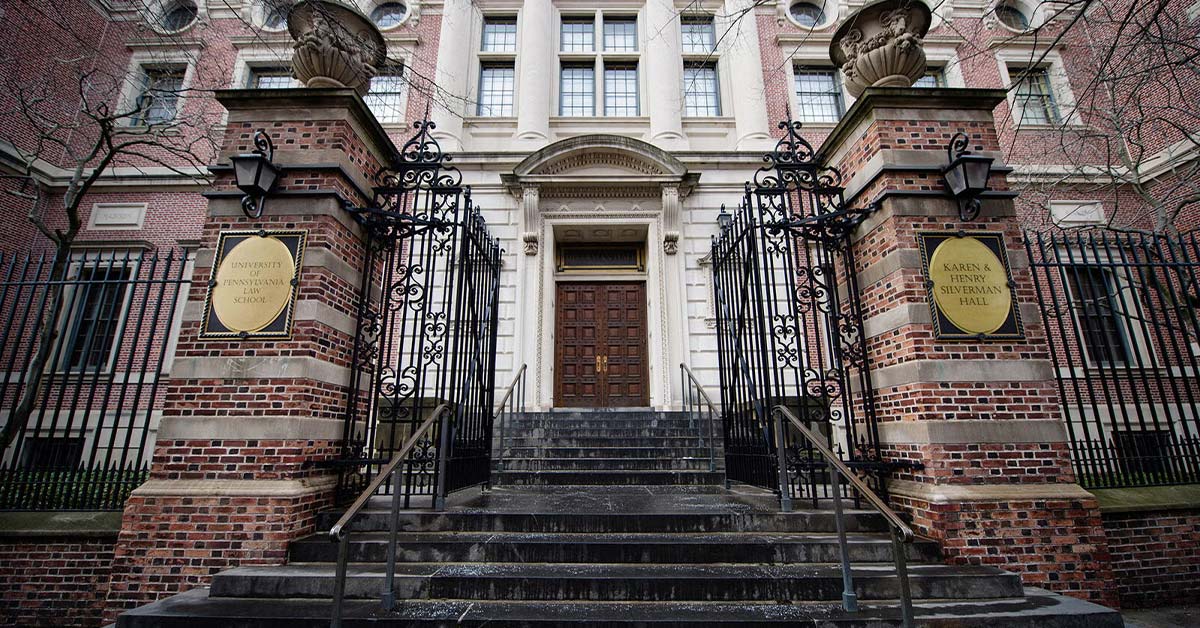
The University of Pennsylvania Carey Law School, established in 1850 with historic ties to James Wilson’s law lectures in 1790, is one of the most prestigious legal institutions in the country. Ranked #5 in the 2025 U.S. News & World Report rankings, Penn Carey Law is known for its rigorous academics and interdisciplinary approach. With a student-faculty ratio of just 4.8:1 and a total enrollment of 809 students, the school offers a highly personalized and intellectually engaging environment.
Penn Carey Law offers a robust Juris Doctor (J.D.) program alongside specialized degrees such as the Master of Laws (LL.M.), Master of Comparative Laws (LL.C.M.), Master of Laws, and Doctor of the Science of Law (S.J.D.). The school is especially notable for its over 35 joint-degree programs with other UPenn schools, including Wharton and Engineering. In 2025, entering students reported a median LSAT score of 172 (25th-75th percentile: 168–174) and a median GPA of 3.93 (range: 3.77–3.99), reflecting the school’s highly selective admissions process.
With a full-time tuition of $80,592, Penn Carey Law provides an excellent return on investment—99.6% of graduates secured full-credit employment within 10 months, and 96.3% passed the bar on their first attempt. The school’s curriculum emphasizes real-world experience through clinics, externships, and pro bono work, preparing students for successful careers in law, business, and government. Its reputation, interdisciplinary opportunities, and strong employment outcomes continue to distinguish Penn Carey Law as a leader in legal education.
4. University Of Georgia

The University of Georgia School of Law, founded in 1859, is one of the oldest and most respected public law schools in the nation. Located in Athens, Georgia, it has earned a reputation for producing prominent alumni, including governors, judges, and legislators. Ranked #22 in the 2025 U.S. News & World Report, UGA Law stands out for its historic legacy, affordability, and commitment to legal excellence. It offers state-of-the-art facilities, including Hirsch Hall and the expansive Alexander Campbell King Law Library.
Academically, UGA Law provides a comprehensive legal education through its Juris Doctor (J.D.), Master of Laws (LL.M.), and M.S.L. programs. The school also supports a variety of dual-degree options such as JD/MBA, JD/MPA, and JD/MPH, reflecting its interdisciplinary strengths. As of 2025, the student body had a median LSAT score of 169 (25th–75th percentile: 159–170) and a median undergraduate GPA of 3.91 (range: 3.62–3.97), demonstrating the competitive nature of its admissions.
UGA Law remains one of the most affordable top-tier law schools in the U.S., with 2025 in-state tuition at $19,460 and out-of-state tuition at $39,596. With a student-faculty ratio of 6.1:1 and 85% of students receiving scholarship aid, the school offers an excellent return on investment. Its outcomes are equally impressive: 94.8% of the class of 2024 secured full-credit jobs within 10 months, and the first-time Bar passage rate stood at 91.6%, underscoring the school’s effectiveness in legal training and career readiness.
5. College Of William & Mary
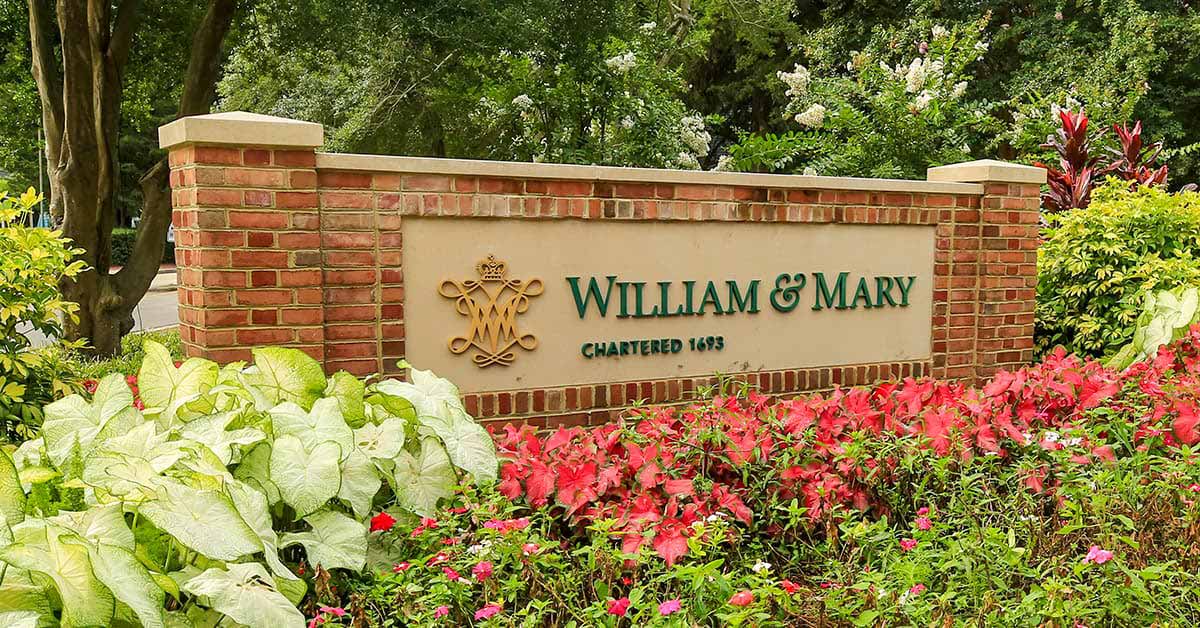
William & Mary Law School, founded in 1779 at the urging of Thomas Jefferson, is the oldest law school in the United States. Located in Williamsburg, Virginia, it played a foundational role in American legal education with George Wythe as its first law professor and Chief Justice John Marshall among its earliest students. As of 2025, the school holds the #31 spot in the U.S. News & World Report law school rankings, reflecting its enduring reputation for academic excellence and legal heritage.
The school offers a Juris Doctor (J.D.) program, an LL.M. in American Legal Studies for international lawyers, and joint degrees such as J.D./M.B.A., J.D./M.P.P., and J.D./M.A. in American Studies. Students benefit from a student-faculty ratio of 6.5:1, allowing personalized academic mentorship. The median LSAT for incoming students in 2025 was 164 (25th–75th percentile: 159–166), and the median undergraduate GPA was 3.75 (range: 3.49–3.86), signaling a competitive yet accessible admissions process.
Tuition is $44,953 for in-state students and $68,576 for out-of-state students. Despite this cost, William & Mary Law delivers strong outcomes: 93% of graduates passed the Bar on their first attempt, and 90.8% secured full-credit employment within 10 months of graduation. With a historic campus, a renovated library holding over 1.8 million titles, and an emphasis on practical training through clinics and clerkships, William & Mary Law provides a distinguished, well-rounded legal education rooted in tradition and innovation.
6. Florida State University
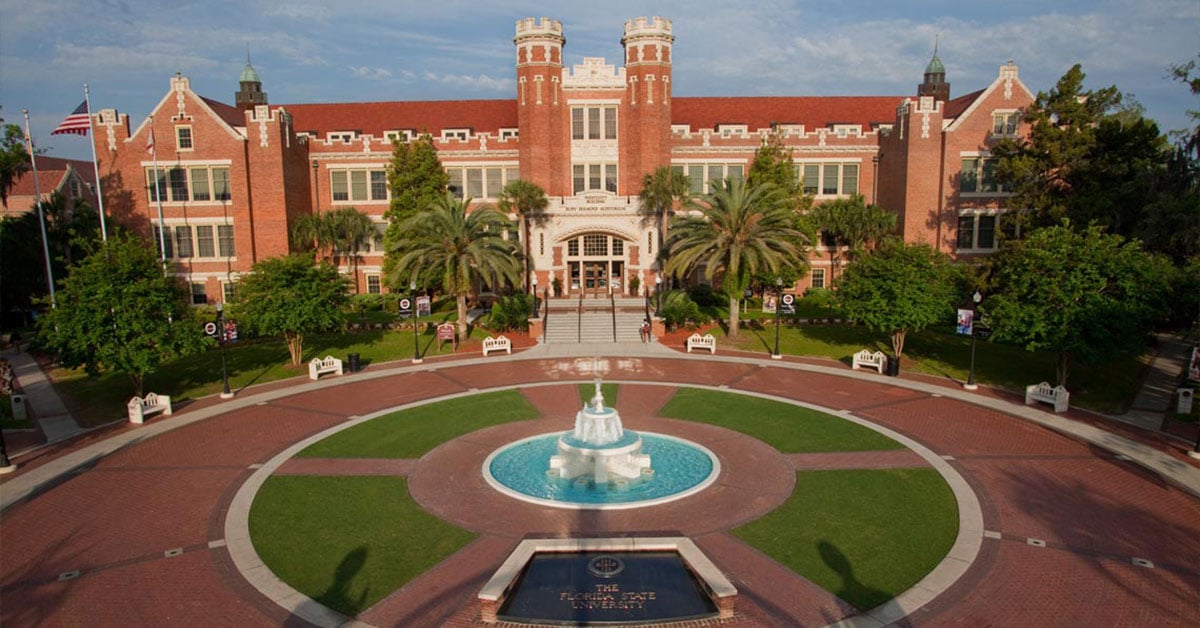
Florida State University College of Law, established in 1966 and located in Tallahassee, Florida, stands out for its prime proximity to the Florida Supreme Court and state legislature. This setting provides unparalleled access to internships and policy-focused externships. In the 2025 U.S. News & World Report rankings, FSU Law is tied at #38 nationally and #17 among public law schools, with standout rankings in Environmental Law (#18), Criminal Law (#34), and Business/Corporate Law (#41), reflecting its growing influence in specialized legal education.
FSU Law offers a robust curriculum and law program that includes the Juris Doctor (J.D.), several LL.M. programs—such as Environmental Law and Policy and Business Law—and a Juris Master (J.M.) for professionals seeking legal literacy. The school also supports numerous dual-degree options like JD/MBA, JD/MPA, and JD/MS in areas such as Sport Management and Aquatic Environmental Science. As of 2025, incoming students presented a median LSAT score of 165 (25th–75th percentile: 158–166) and a median GPA of 3.91 (range: 3.59–3.97), highlighting competitive admissions.
With in-state tuition at $20,693 and out-of-state tuition at $40,705, FSU Law remains affordable, especially considering that 76.6% of students receive scholarships averaging $15,000. The school boasts strong outcomes: 83% first-time Bar passage and 97.3% full-credit employment within ten months post-graduation. The student-faculty ratio is a low 4.7:1, enabling close mentorship. Under Dean Erin O’Hara O’Connor’s leadership since 2016, FSU Law emphasizes experiential learning, making it a compelling choice for aspiring legal professionals.
7. Harvard Law School

Harvard Law School (HLS), founded in 1817, is the oldest continuously operating law school in the United States and one of the most prestigious institutions globally. Located in Cambridge, Massachusetts, it pioneered the case method under Dean Christopher Columbus Langdell in the 1870s, now a foundational teaching style in legal education. As of 2025, HLS is ranked #6 in the U.S. News & World Report, with exceptional specialty rankings: #1 in Business/Corporate Law and Contracts, #2 in Constitutional and International Law, and #3 in Criminal Law.
HLS offers a broad range of degree programs, including the Juris Doctor (J.D.), Master of Laws (LL.M.) for international lawyers, and Doctor of Juridical Science (S.J.D.) for aspiring academics. Additionally, it features numerous joint degree options such as JD/MBA, JD/MPP, and JD/MPH in collaboration with other Harvard schools. The school enrolls approximately 1,797 students with a student-faculty ratio of 6.9:1. In 2025, admitted students had a median LSAT score of 174 (25th–75th percentile: 171–176) and a median GPA of 3.95 (range: 3.89–4.0).
Tuition for full-time students stands at $78,692, with impressive outcomes: a 96.1% first-time Bar passage rate and the same percentage for full-credit employment within 10 months. The school’s alumni network includes U.S. Presidents, Supreme Court Justices, and global leaders. With the world’s largest academic law library and a culture of academic rigor, HLS offers students an elite legal education grounded in tradition and global influence.
8. Columbia Law School
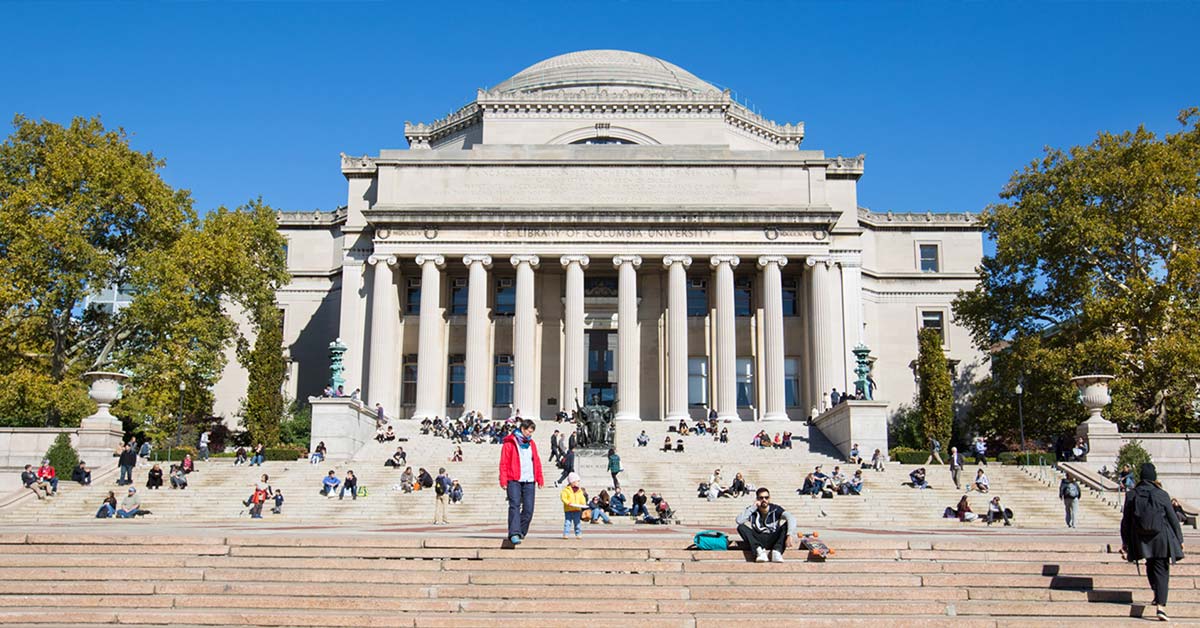
Columbia Law School, founded in 1858 and rooted in legal instruction dating back to 1793, is one of the oldest and most prestigious institutions for legal education in the U.S. Located in New York City, its proximity to courts, firms, and international organizations provides students with unparalleled professional exposure. As of 2025, Columbia ranks #10 nationally according to U.S. News & World Report and excels in several specialty areas, including #2 in Business Law and #3 in International Law, affirming its elite status.
The school offers a rigorous Juris Doctor (J.D.) program alongside specialized graduate degrees such as the Master of Laws (LL.M.), Executive LL.M. in Global Business Law, and Doctor of the Science of Law (J.S.D.). Columbia also supports dual degrees with other departments like business, international affairs, and public health. For the 2025 academic year, admitted students reported a median LSAT score of 173 (25th–75th percentile: 170–175) and a median GPA of 3.9 (range: 3.81–3.96), reflecting the school’s competitive admissions.
Columbia Law’s tuition stands at $84,820, a premium matched by impressive outcomes—95.5% of graduates passed the Bar on their first attempt, and 96.7% secured full-credit employment within ten months. With a student-faculty ratio of 6.1:1 and a robust network of legal scholars and alumni, including U.S. Presidents and Supreme Court Justices, Columbia combines academic depth with real-world access. Its dynamic curriculum, renowned faculty, and strategic location make it a top choice for aspiring legal professionals.
9. New York University School Of Law
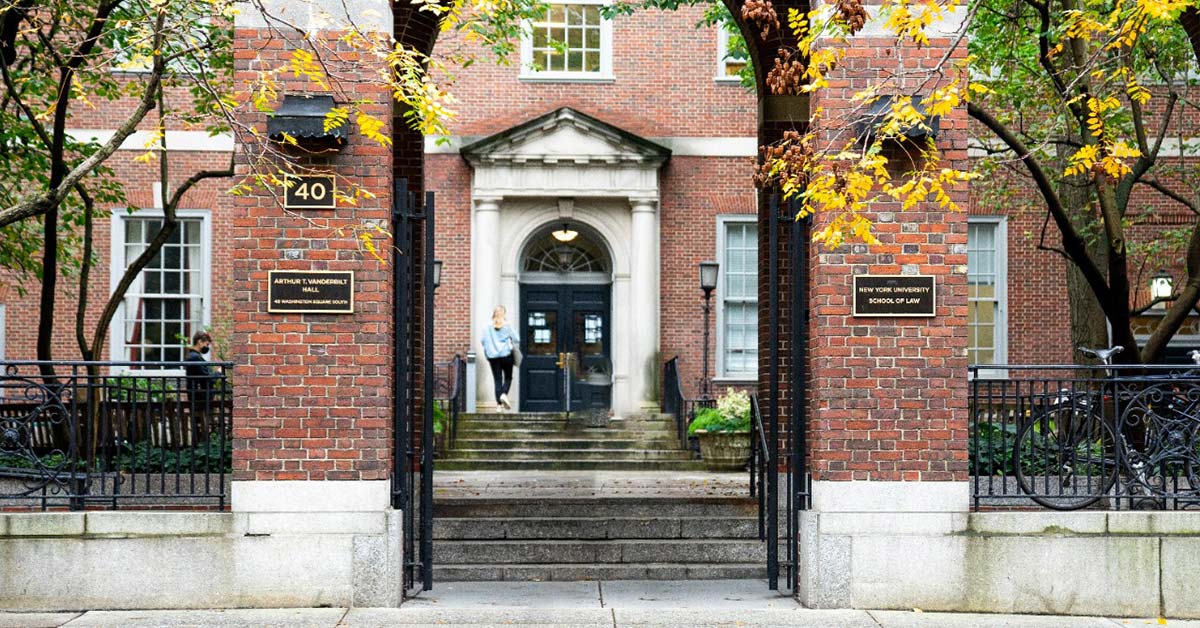
New York University School of Law, founded in 1835, is the oldest law school in New York City and one of the most prestigious in the country. Located in Manhattan’s Greenwich Village, it offers students unmatched access to major law firms, courts, and international institutions. In the 2025 U.S. News & World Report rankings, NYU Law is tied for #8 nationally and holds the #1 spot in Criminal Law, International Law, and Tax Law, showcasing its strength in key legal disciplines.
NYU Law provides a diverse suite of academic programs, including the Juris Doctor (J.D.), Master of Laws (LL.M.), Doctor of Juridical Science (J.S.D.), and several interdisciplinary degrees, such as the MS in Cybersecurity Risk and Strategy. The school also offers joint international programs with institutions like the National University of Singapore and the University of Melbourne. For the 2025 entering class, the median LSAT score was 172 (25th–75th percentile: 169–173) and the median GPA was 3.91 (range: 3.8–3.96), reflecting a highly selective admissions process.
With tuition set at $83,152 and a student-faculty ratio of 5.4:1, NYU Law emphasizes both academic excellence and personal mentorship. The school boasts a 96.6% first-time Bar passage rate and a 97.3% employment rate within ten months of graduation. NYU Law is also known for its robust public service programs, including the Root-Tilden-Kern Scholarship and Loan Repayment Assistance Program (LRAP), reinforcing its commitment to justice and equity in legal practice.
10. Duke University School Of Law

Duke University School of Law, founded in 1868 and officially integrated into Duke University in 1924, has become one of the nation’s premier law schools. Located in Durham, North Carolina, the school consistently ranks among the top institutions and is tied at #6 in the 2025 U.S. News & World Report rankings. Known for academic rigor and innovation, Duke Law holds top-15 rankings in specialties like Criminal Law (#9), International Law (#13), and Tax Law (#10), reinforcing its broad legal expertise.
The school offers a comprehensive range of degree programs, including the Juris Doctor (J.D.), Master of Laws (LL.M.), and Doctor of Juridical Science (S.J.D.). Duke Law School also provides multiple dual-degree options, such as JD/MBA with the Fuqua School of Business, JD/MD with the School of Medicine, and JD/MPP with the Sanford School of Public Policy. For 2025, incoming students boasted a median LSAT score of 170 (25th–75th percentile: 168–171) and a median GPA of 3.89 (range: 3.79–3.96), highlighting the competitiveness of admissions.
Tuition for the full-time program is $78,774, and the student-faculty ratio is a close 5.4:1. Duke Law’s graduates enjoy outstanding outcomes, with 94.4% passing the Bar on their first attempt and 97.9% achieving full-credit employment within ten months of graduation. The school’s emphasis on interdisciplinary learning, experiential education through clinics and journals, and a collaborative academic culture make it a compelling choice for students pursuing high-level legal careers in diverse fields.
The Importance Of Choosing The Right Law School
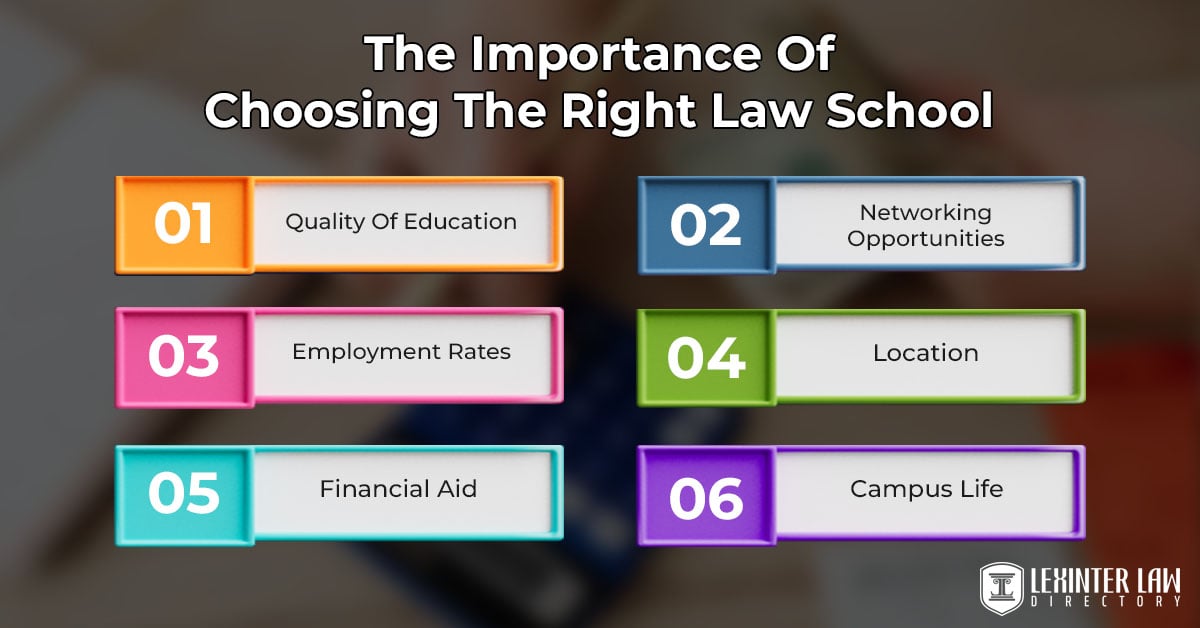
Picking the right law school is a big deal. It sets the path for your career. A good school gives you good teachers, good training, and can help you get a good job.
Quality Of Education
A top law school offers top teaching. The teachers know a lot and can help you learn a lot. The school often has a big library, top-level classes, and other resources. A good education makes you a better lawyer.
Networking Opportunities
You meet people in a good law school who can help you later. This could be other students, teachers, or even visiting speakers. Connections help you when you look for jobs or need advice in your career.
Employment Rates
Look at the number of students who get jobs after graduating. If 90% or more find jobs fast, it’s a good sign. Schools with high job rates often have strong ties to law firms and companies.
Location
Where the school is situated matters; if you want to work in New York, a school in New York is a good idea. Also, schools close to big cities offer more chances for internships and jobs.
Financial Aid
Good schools often have money to help students. They offer scholarships or low-interest loans. Money help can make it easier for you to focus on your studies.
Campus Life
Is the campus a good place to live and learn? You’ll spend three years of your life there. A nice campus with good facilities like gyms and cafes makes your time more enjoyable.
Factors To Consider When Choosing A College
When you pick a college, you have to think about many things. Here’s a deep dive into what matters:
Location And Regional Focus
First, think about where the college is. Do you want to stay close to home or explore a new place? If you like the beach, pick a college near the coast. City or countryside? Make your choice.
Reputation And Ranking
Next, look at how good the college is. You can find lists that rank colleges. But remember, the best college for you fits your needs, not just a high rank.
Specialized Programs And Opportunities
Does the college offer the major you want? Are there special classes or clubs you’re excited about? If you want to study science, make sure they have good labs. If you like art, see if they have studios.
Alumni Network And Industry Connections
After you finish college, knowing people can help you find a job. A strong alumni network means you have more people who can help you later. Some colleges also have strong links to companies. That could help you get a job, too.
Cost, Scholarships, And Financial Aid
Last but not least, look at the cost. College can be pricey. Do they offer scholarships or other ways to pay less? You have to think about this to make sure you can afford it.
Comparing East Coast Law Schools
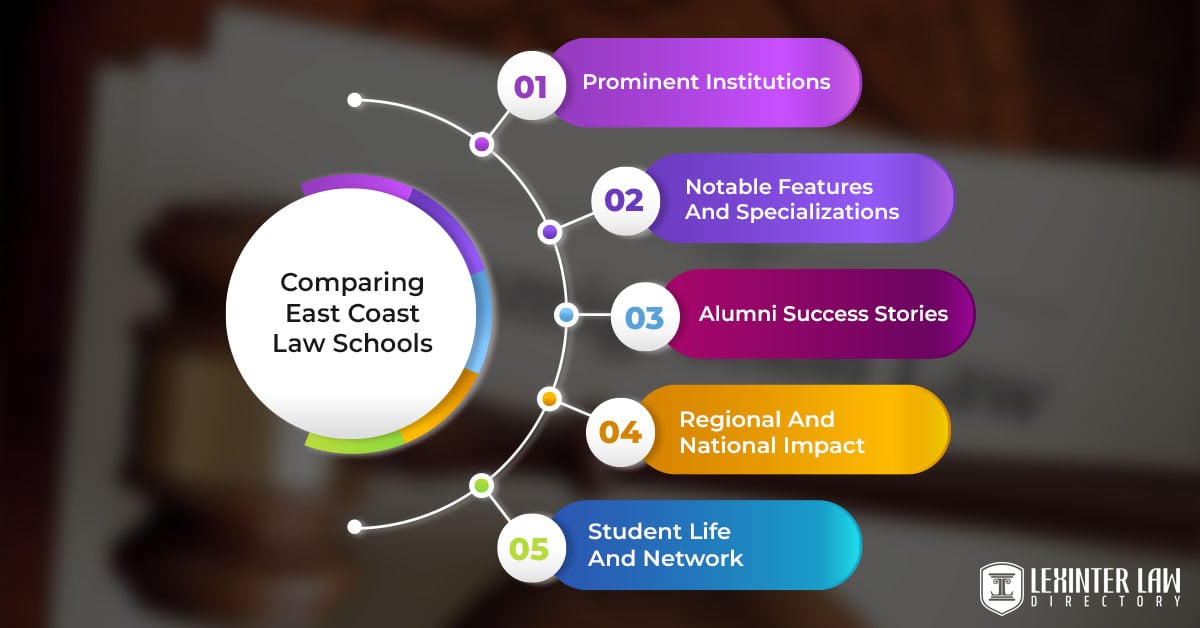
Choosing the right law school is a big deal when you want to be a lawyer. Let’s talk about some top law schools on the East Coast.
Prominent Institutions
Harvard, Yale, and Columbia are some of the most prestigious law schools in the United States, all located on the East Coast. Their long-standing reputations for academic excellence and leadership in legal education make them highly respected institutions where graduates are recognized and valued around the world.
Notable Features And Specializations
Each school offers unique strengths in different areas of law. Harvard is especially known for its top-tier international law courses. Yale stands out for its leadership in constitutional law. Columbia is a great choice for business and corporate law, offering focused tracks for students with those specific interests.
Alumni Success Stories
Graduates from these schools often go on to achieve remarkable careers. U.S. Supreme Court Justice Ruth Bader Ginsburg attended Columbia. Former President Barack Obama graduated from Harvard Law. Yale produced Justice Sonia Sotomayor. These alumni prove the incredible potential and success that can follow a degree from these institutions.
Regional And National Impact
While many graduates work in major East Coast cities like Boston, New York, and Washington, D.C., the impact of these schools is national. Their alumni take on roles in government, private practice, and academia throughout the United States, influencing public policy, legal reform, and international law practice.
Student Life And Network
Life as a student at these law schools is both intense and rewarding. Harvard offers a wide range of student-run law clubs. Yale fosters deep academic connections through small study groups. Columbia’s urban campus in New York provides unmatched networking opportunities, helping students build strong, career-boosting professional relationships.
The Bottom Line
Acquiring legal education is a sure way to build a brilliant, stable, and prestigious career in the future. This industry is so diversified and in demand that there are many great job opportunities for everyone. So, the only question is which school to choose to make the most of your degree in the future.
While there are plenty of good law schools in the US, choosing the best one for you can be a real challenge. In order to make this choice, future students have to pay attention to a wide range of factors, including the quality of instruction, graduates’ employment rates, cost, and many others. But now, you have a good starting point to make the best choice.
After reading this article, you know about the ten best law schools located on the East Coast. Consider the options we shared here – to make the best choice for you!

